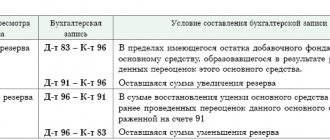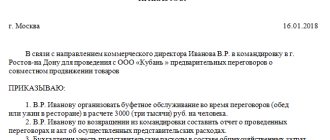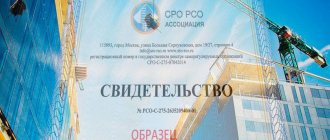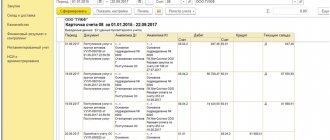Answer
Property received free of charge should be reflected in the inventory if the period of its use is less than 12 months, and as fixed assets if the joint investment is more than 12 months at market value.
If the property is not real estate, a vehicle, shares or shares, then an independent appraisal is not needed. Information about the market value can be obtained from any publicly available sources; it may be indicated in the gift agreement, although this is not required. Upon receipt the following transaction is made:
Dt 10 - Kt 91.1 or Dt 01 - Kt 91.1.
In my opinion, expenses associated with property received free of charge cannot form the market value of the property and cannot be taken into account for profit tax purposes.
For accounting purposes according to FAS 6/2020, the price of the property does not matter. FAS 6/2020 does not contain a price limit for classifying assets as fixed assets. The indicator is the period of use.
You can write off the cost of property as an expense at a time if you approve this procedure in your accounting policy.
FAS 26/2020 determines the procedure for accounting for costs of creating (or acquiring) assets that will be taken into account as fixed assets. Actually, as before, costs are first reflected on account 08. If there are no costs, then the standard does not apply.
For assets that cannot be included in inventories (service life of more than 12 months), the organization has the right to decide to write them off immediately on the date of commissioning. To do this, you need to approve in the accounting policy the level of materiality and the group of assets that will be written off at a time.
Additionally, I inform you that the value of property written off as expenses can be recognized for profit tax purposes, provided that it was taken into account in taxable profit upon receipt.
Income in the form of gratuitously received property (work, services), property rights
At the beginning of its activities, each organization needs some kind of financial assistance from its founders. The latter often help their “brainchild” stay afloat by providing all kinds of contributions and interest-free loans. Very often, property is transferred to the public for ownership or use free of charge.
Periodically, there are operations for the gratuitous transfer and receipt of property and property rights from many organizations in the course of their activities. However, organizations need to be very careful when receiving such “gifts”. Doesn't the obligation to pay tax to the budget arise at the same time? Tax authorities always pay attention to the assistance received free of charge and will not miss the opportunity to replenish the budget. Property received free of charge as income
The list of income that taxpayers on the simplified tax system must take into account is given in paragraph 1 of Art. 346.15 Tax Code of the Russian Federation . Structurally, all income in it is divided into two large groups:
– income from the sale of goods (work, services), sale of property and property rights. These incomes must be determined in accordance with Art. 249 Tax Code of the Russian Federation ;
– non-operating income. They are determined in accordance with Art. 250 Tax Code of the Russian Federation .
In this case, income is not taken into account, the list of which is given in Art. 251 of the Tax Code of the Russian Federation , and dividends, if taxes are withheld from them by tax agents.
In paragraph 1 of clause 8 of Art. 250 of the Tax Code of the Russian Federation establishes that non-operating income includes income in the form of gratuitously received property (work, services) or gratuitously received property rights, with the exception of the income specified in Art. 251 Tax Code of the Russian Federation . According to paragraphs. 11 clause 1 of this article, when determining the tax base, income in the form of property received by a Russian organization free of charge is not taken into account:
– from an organization, if the authorized (share) capital (fund) of the receiving party consists of more than 50% of the contribution (share) of the transferring organization;
– from an organization, if the authorized (share) capital (fund) of the transferring party consists of more than 50% of the contribution (share) of the receiving organization;
– from an individual, if the authorized (share) capital (fund) of the receiving party consists of more than 50% of the contribution (share) of this individual.
Please note : received property is not recognized as income for tax purposes if, within a year from the date of its receipt (except for cash), it is not transferred to third parties.
A taxpayer who has received free of charge property that is not depreciable, work or services, when taxed, must assess the income associated with them based on market prices determined taking into account the provisions of Art. 40 Tax Code of the Russian Federation . The valuation should not be lower than production (purchase) costs. This is stated in paragraph. 2 clause 8 art. 250 Tax Code of the Russian Federation . If depreciable property is acquired free of charge, then the income must be assessed based on market prices determined taking into account the provisions of Art. 40 of the Tax Code of the Russian Federation , but not lower than those established in accordance with the norms of Chapter. 25 Tax Code of the Russian Federation . Information on the prices of property (work, services) received free of charge can be confirmed either with documents or by conducting an independent assessment.
Let us note that if the transfer of property or property rights is of an investment nature (contribution of the founder to the authorized capital, contribution of a participant under a simple partnership agreement, etc.), then there is no need to talk about gratuitous transfer in this case. The transfer of property on condition of return (provision of credit or loan) cannot be considered gratuitous.
The Civil Code establishes some restrictions for concluding a gift agreement. Thus, donation is prohibited between commercial organizations. An exception is when the value of the gift does not exceed 5 minimum wages. This is stated in paragraph 4 of Art. 575 Civil Code of the Russian Federation . But if one of the parties is a non-profit organization or an individual, then the gift agreement can be concluded completely freely.
Loan agreement
Often, the gratuitous transfer of property is carried out without transfer of ownership, but for a certain period. In this case, a free use (loan) agreement is concluded. Does the receiving party need to account for income? Yes need. This position was expressed by the Ministry of Finance in letters dated 02/17/200 6 No. 03-03-04/1/125 and dated 04/19/200 6 No. 03-03-04/1/359 . The Presidium of the Supreme Arbitration Court of the Russian Federation also agrees with her, which in paragraph 2 of Information Letter No. 98 dated December 22, 2005 expressed a similar approach.
Question: The company is on the simplified tax system and has entered into an agreement for the free use of non-residential premises. In this case, does the LLC have an object of taxation for the purposes of applying Ch. 26.2 Tax Code of the Russian Federation ? If it occurs, then to what extent?
In accordance with paragraph 1 of Art. 346.15 “Procedure for determining income” of the Tax Code of the Russian Federation, taxpayers when determining the object of taxation along with income from sales determined in accordance with Art. 249 of the Tax Code of the Russian Federation , non-operating income, determined in accordance with Art. 250 Tax Code of the Russian Federation . In this case, income provided for in Art. 251 Tax Code of the Russian Federation .
In this situation, the organization uses the property on the basis of a loan agreement. Clause 1 of Art. 689 of the Civil Code of the Russian Federation provides that under an agreement for gratuitous use (loan agreement), one party (the lender) undertakes to transfer or transfers an item for gratuitous temporary use to the other party (the borrower), and the latter undertakes to return the same item in the condition in which it received it , subject to normal wear and tear or in the condition stipulated by the contract. In accordance with paragraph 2 of this article, the rules on the lease agreement are accordingly applied to the agreement for gratuitous use.
When receiving property under a free use agreement, the organization receives the right to use this property free of charge. Taking into account the above, for profit tax purposes, the receipt of property for free use should be considered as the gratuitous receipt of property rights. Income in the form of gratuitously received property rights is subject to inclusion in the non-operating income of the borrower on the basis of clause 8 of Art. 250 Tax Code of the Russian Federation .
When receiving property (work, services) free of charge, income is assessed based on market prices determined taking into account Art. 40 of the Tax Code of the Russian Federation , but not lower than that determined in accordance with Chapter. 25 of the Tax Code of the Russian Federation, residual value - for depreciable property and not less than the cost of production (purchase) - for other property (work performed, services rendered). Information on prices must be confirmed by the taxpayer - the recipient of the property (work, services) documented or by conducting an independent assessment.
Established in paragraph 8 of Art. 250 of the Tax Code of the Russian Federation, the principle of determining income when receiving property free of charge, which consists in its assessment based on market prices determined taking into account Art. 40 of the Tax Code of the Russian Federation , is also used when assessing property rights, including the right to use a thing. Thus, a taxpayer who received property for gratuitous use under an agreement includes in non-operating income income in the form of a gratuitously received right to use the property, determined on the basis of market rental prices for identical property.
This conclusion is confirmed in paragraph 2 of the Review of the practice of resolving cases by arbitration courts related to the application of certain provisions of Chapter. 25 of the Tax Code of the Russian Federation ( Information letter of the Presidium of the Supreme Arbitration Court of the Russian Federation dated December 22, 2005 No. 98 ).
Interest-free loan
Sometimes organizations receive interest-free loans. In this situation, accountants very often have a question: is it necessary to tax the material benefits received from saving on interest? Let's try to figure it out.
Subclause 8, clause 1, art. 250 of the Tax Code of the Russian Federation classifies as non-operating income income in the form of gratuitously received property (work, services) or property rights, except for the cases specified in Article 251 of this Code. If a taxpayer received an interest-free loan, does he receive an economic benefit from the free use of the funds received? If yes, then should he include it in the tax base?
The concept of gratuitously received property (work, services) for the purposes of calculating income tax is given in paragraph 2 of Art. 248 of the Tax Code of the Russian Federation : property (work, services) or property rights are considered received free of charge if the receipt of this property (work, services) or property rights is not associated with the occurrence of an obligation on the recipient to transfer property (property rights) to the transferor (perform work for the transferor , provide services to the transferor).
Consequently, important factors for gratuitous transfer are the transfer of ownership to the donee and the absence of a counter-obligation from the donee. According to tax officials, expressed in letters, the taxpayer does not generate income when receiving an interest-free loan. For example, from the Letter of the Federal Tax Service for Moscow dated November 3, 2004 No. 26-12/71407, it follows that the temporary use of borrowed funds under an interest-free loan agreement is not considered as the basis for the occurrence of non-operating income of the organization in the form of material benefits from savings on interest. A similar point of view is expressed in the Letter of the Department of Tax Administration for Moscow dated February 27, 2004 No. 04-23/3244/G557 “On income tax” .
But often tax inspectors recognize the emergence of material benefits from the borrower and demand that they be taxed, which is confirmed by arbitration practice. In their opinion, an interest-free loan is a gratuitous service, and the taxpayer receives non-operating income in the form of material benefits from savings on interest. The amount of benefit must be determined by the amount of interest accrued based on the refinancing rate established by the Central Bank of the Russian Federation during the period of use of borrowed funds.
You can argue with fiscals. In order to show the shortcomings of their position, let us focus on two points. First, let’s ask ourselves: can an interest-free loan be considered a gratuitous service? Services are provided within the framework of an agreement on the provision of paid services ( Chapter 39 of the Civil Code of the Russian Federation ). In accordance with paragraph 1 of Art. 779 of the Civil Code of the Russian Federation, under a contract for the provision of paid services, the contractor undertakes, on the instructions of the customer, to provide services (perform certain actions or carry out certain activities), and the customer undertakes to pay for these services.
The concept of service is given in clause 5 of Art. 38 of the Tax Code of the Russian Federation : it recognizes activities the results of which do not have material expression, are sold and consumed in the process of carrying out this activity.
Relations under an interest-free loan agreement are regulated by Ch. 42 “Loan and Credit” of the Civil Code of the Russian Federation . According to paragraph 1 of Art. 807 of the Civil Code of the Russian Federation , under a loan agreement, one party (the lender) transfers into the ownership of the other party (borrower) money or other things determined by generic characteristics, and the borrower undertakes to return to the lender the same amount of money (loan amount) or an equal number of other things received by him of the same kind and quality.
According to paragraph 1 of Art. 809 of the Civil Code of the Russian Federation, the lender has the right to receive interest from the borrower on the loan amount, but it is not at all obligatory. Otherwise (free of charge) may be provided by law or contract.
Based on the foregoing, we can conclude that the relationship under the loan agreement does not contain signs of a service. It should be noted that the highest court also proceeds from the need for a clear distinction between these two contractual types. The Presidium of the Supreme Arbitration Court of the Russian Federation voiced its approach to this problem in Resolution No. 3009/04 dated 03.08.2004 . A similar point of view was expressed by the tax authorities. Thus, the Department of Tax Administration for the city of Moscow Letter No. 04-23/3244/G557 02/27/200 4 indicated: civil law does not consider the payment of interest under a loan agreement as payment for services rendered, distinguishing between an agreement for the provision of services and an agreement for the transfer of funds for loan agreement.
Now let's ask one more question: can the material benefit from saving on interest for using an interest-free loan be recognized as income for tax purposes? The Tax Code recognizes as income an economic benefit in cash or in kind, taken into account if it is possible to assess it to the extent that such benefit can be assessed and determined in accordance with the chapters “Tax on personal income”, “tax on profit (income) of organizations ..." ( clause 1 of article 41 of the Tax Code of the Russian Federation ). However, Ch. 25 of the Code does not consider the material benefit from savings on interest for the use of borrowed funds as income subject to taxation and, accordingly, does not contain rules for its recognition and accounting. Consequently, the material benefit in question cannot be recognized as income for tax purposes.
In addition to the above, we note that in accordance with paragraphs. 10 p. 1 art. 251 of the Tax Code of the Russian Federation does not include in the taxable base income in the form of funds or other property received under credit or loan agreements (other similar funds or other property, regardless of the form of registration of borrowings, including securities under debt obligations), as well as funds or other property, received to repay such borrowings.
Despite the fact that some fiscal authorities try to tax the economic benefits from interest-free loans, arbitration practice clearly resolves the issue in favor of taxpayers. Thus, the FAS Volga District in Resolution No. A57-3029/05-7 dated January 18, 2006 indicated that Chapter 25 of the Tax Code The Russian Federation “Tax on profit (income) of organizations” does not provide for such a form of economic benefit as savings on interest, and does not establish the procedure for its determination.
Thus, an interest-free loan as an obligation obliging the borrower to return the funds received under the loan agreement is not considered an object of income taxation.
Similar conclusions were reached by other courts. Thus, taxpayers, in the event of disagreements with tax authorities regarding the taxation of loans, have a real chance of proving their case in court and winning the dispute.
When the article was published, the financial department issued a letter in favor of the taxpayer. Letter dated 04/02/2007 No. 03-11-04/2/78 : due to the fact that Art. 250 of the Code does not provide for the inclusion in the non-operating income of taxpayers of amounts of material benefits under interest-free loan agreements; organizations applying the simplified taxation system should not determine the amounts of material benefits under such agreements.
Hello Guest! Offer from "Clerk"
Online professional retraining “Chief accountant on the simplified tax system” with a diploma for 250 academic hours . Learn everything new to avoid mistakes. Online training for 2 months, the stream starts on March 1.
Sign up





